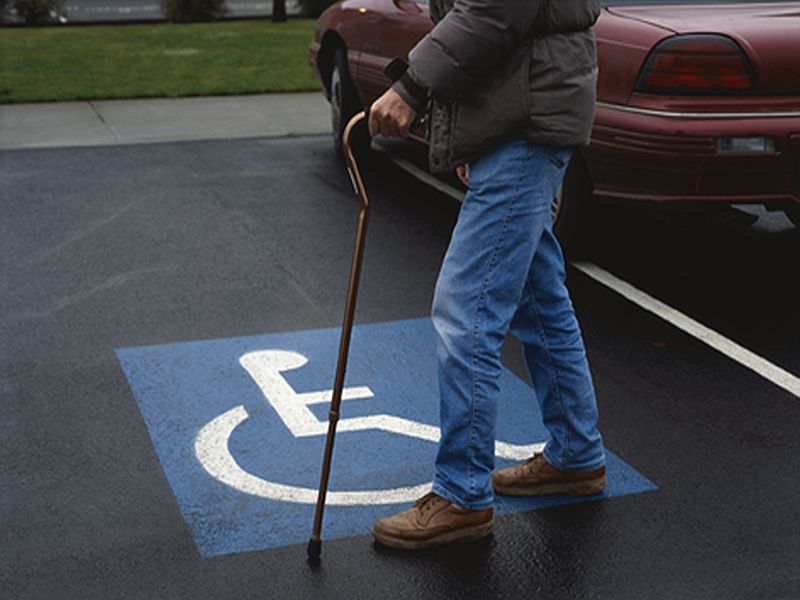Monday - Friday 8:30am to 7:00pm
Saturday - 8:30am to 4:00pm
Sunday - Closed
Get Healthy!
Results for search "Nonsteroidal Anti-Inflammatory Drugs (NSAIDs)".
Health News Results - 22
Millions of Americans suffer from arthritis, and many reach for medication to ease their joint pain and inflammation.
The options might seem overwhelming, though. Here, the Arthritis Foundation offers some suggestions for meds that can be purchased at a local drug store or filled with a doctor's prescription, whether your pain is caused by normal wear and tear (osteoarthritis) or inflamma...
- Cara Murez HealthDay Reporter
- |
- September 19, 2023
- |
- Full Page
It's well known that certain forms of birth control carry a small risk of blood clots. Now a large new study suggests that some common painkillers can magnify that risk.
The study, of 2 million Danish women, found what numerous others have before: Women who used birth control pills or other estrogen-containing contraceptives had a heightened risk of developing a blood clot in the legs or ...
- Amy Norton HealthDay Reporter
- |
- September 8, 2023
- |
- Full Page
Aspirin, naproxen and other common pain medications known as NSAIDs worsen gastrointestinal infections caused by a bacterium known as Clostridioides difficile (C. diff), new research shows.
NSAIDs (nonsteroidal anti-inflammatory drugs) are widely used to ease pain and inflammation. In a new study using mice, researchers set out to find why they exacerbate C. diff, the leading cau...
- Cara Murez HealthDay Reporter
- |
- July 21, 2023
- |
- Full Page
Over-the-counter pain relievers like aspirin, Aleve or ibuprofen don't do a thing to slow the progression of knee arthritis, and might even make things worse, a new study suggests.
Knee arthritis patients who regularly took nonsteroidal anti-inflammatory drugs (NSAIDs) wound up with worse knee inflammation and weakened cartilage, compared to a "control" group not taking the medications, <...
- Dennis Thompson HealthDay Reporter
- |
- November 22, 2022
- |
- Full Page
People with type 2 diabetes might face a substantially increased risk of heart failure if they take ibuprofen or some other type of nonsteroidal anti-inflammatory drug (NSAID), a new Danish study indicates.
Short-term
Persistent use of steroids and non-steroidal anti-inflammatory drugs (NSAIDs) like ibuprofen to treat acute lower back pain may actually turn it into a chronic condition, a new study warns.
However, some experts who expressed concerns about the study published in the journal Science Translational Medicine
- By Robert Preidt HealthDay Reporter
- |
- May 12, 2022
- |
- Full Page
Acetaminophen may do wonders for a headache, but using it for long-term pain relief could prove risky for people with high blood pressure, a new clinical trial suggests.
Over two weeks of use, the painkiller caused blood pressure to spike in people who already had elevated numbers, the researchers found. That was true whether they were on blood pressure medication or not.
The findin...
- |
- February 11, 2022
- |
- Full Page
Addictive opioid painkillers aren't the only option for patients seeking relief following anterior cruciate ligament (ACL) knee reconstruction, researchers say.
As the United States wrestles with skyrocketing rates of opioid abuse and drug overdose deaths, the findings may come as good news.
After ACL surgery, Advil and other nonsteroidal anti-inflammatory drugs (NSAIDs), acetaminop...
- Alan Mozes HealthDay Reporter
- |
- November 23, 2021
- |
- Full Page
Antidepressants called selective serotonin reuptake inhibitors (SSRIs) are a mainstay of depression treatment, but a new study warns that taking common painkillers alongside SSRIs may raise the chances for intestinal bleeding.
In a review of 10 published studies involving 6,000 patients, researchers found that those taking SSRIs (such as Celexa, Paxil, Prozac and Zoloft) and pain medicati...
- Steven Reinberg HealthDay Reporter
- |
- October 26, 2021
- |
- Full Page
Illustrating a heartbreaking cycle, new research finds that lonely seniors are much more likely to take opioid painkillers, sedatives, anti-anxiety drugs and other medications.
This puts them at increased risk for drug dependency, attention problems, falls, accidents and mental decline, the University of California, San Francisco researchers warned.
"There's a misconception that as ...
- Robert Preidt
- |
- July 29, 2021
- |
- Full Page
A new research review offers good news for migraine sufferers: There are more pain-relieving options than ever.
In an analysis of over 100 published studies, researchers found that several drug classes showed good evidence they ease the pain of a migraine-in-progress.
Some of those medications have only become available in the past few years, opening up new options for migraine suff...
- Amy Norton HealthDay Reporter
- |
- June 16, 2021
- |
- Full Page
Taking nonsteroidal anti-inflammatory drugs (NSAIDs) such as ibuprofen doesn't make COVID-19 worse or more deadly, a new study finds.
When the pandemic began, doctors debated if NSAIDs increased the severity of COVID-19, but this study reports that the use of NSAIDs is safe, the researchers said. Common NSAIDs include Advil (ibuprofen) and Aleve (naproxen).
In the study, 30% of the ...
- Steven Reinberg
- |
- May 10, 2021
- |
- Full Page
Nearly one in five Americans with high blood pressure use medications that can cause blood pressure to spike, a preliminary study shows.
The researchers said the findings are concerning, given how many people have difficulty controlling their high blood pressure.
"A large number of Americans are not meeting their blood pressure goals," said lead researcher Dr. John Vitarello, an int...
- Amy Norton HealthDay Reporter
- |
- May 7, 2021
- |
- Full Page
You finally managed to score an appointment to be vaccinated against the new coronavirus and you're a little nervous about side effects, so taking a painkiller right before you get your shot seems like a smart idea.
Not so fast, says the U.S. Centers for Disease Control and Prevention. Instead, the agency is telling people not to take pain medications like Motrin, Advil or Tylenol before ...
- Steven Reinberg HealthDay Reporter
- |
- February 18, 2021
- |
- Full Page
About 30 million U.S. adults live with osteoarthritis and the pain and stiffness it causes, a new survey finds.
And nearly one-third of these people said their symptoms are not well-managed, according to the Arthritis Foundation survey of almost 2,000 adults. In osteoarthritis, the cartilage cushioning the joints gradually wears down, leading to swelling, and limiting a person's abili...
- Cara Roberts Murez
- |
- October 20, 2020
- |
- Full Page
If you're pregnant and you think popping nonsteroidal anti-inflammatory drugs (NSAIDs) for your aches and pains is safe, think again.
The U.S. Food and Drug Administration warned on Thursday that taking these widely used painkillers -- which include Advil, Motrin, Aleve and Celebrex -- at 20 weeks or later in a pregnancy could raise the risk of complications.
Specifically, t...
- Robert Preidt
- |
- October 16, 2020
- |
- Full Page
People with common muscle and joint injuries should skip opioids and instead reach for over-the-counter pain relievers, new treatment guidelines suggest.
The recommendations, from the American College of Physicians and American Academy of Family Medicine (AAFP), cover acute musculoskeletal injuries -- woes ranging from sprained joints and strained muscles, to inflamed tendons and whip...
- Amy Norton
- |
- August 17, 2020
- |
- Full Page
Opioids are no better than other meds at quelling the pain of a pulled tooth, a new study finds, suggesting it may be possible to significantly reduce their use in dentistry.
University of Michigan researchers asked more than 325 people who had teeth pulled to rate their pain and satisfaction within six months of their extraction.
About half of those who had surgical extract...
- Robert Preidt
- |
- March 13, 2020
- |
- Full Page
Opioid painkillers may temporarily ease the discomfort of arthritis, but they have no clear lasting benefit, a research review finds.
In an analysis of 23 clinical trials, researchers found that, on average, opioid medications were somewhat effective at easing pain in patients with osteoarthritis. That's the common form of arthritis in which cartilage cushioning the joints gradually w...
- Amy Norton
- |
- November 11, 2019
- |
- Full Page
With so much attention focused on the dangers of opioid painkillers, it's easy to forget that even "safe" over-the-counter products carry some dangers.
If you don't think twice about reaching for a pill to relieve aches and pains, especially medicines called nonsteroidal anti-inflammatory drugs, or NSAIDs, you need to know about the wide-ranging cautions surrounding their use, especi...
- Len Canter
- |
- October 7, 2019
- |
- Full Page
If you have chronic kidney disease, taking opioids for pain may increase your odds of hospitalization or early death, a new study suggests.
The risks were particularly elevated at the highest opioid doses, the researchers said.
"We found that receipt of prescription opioids was associated with a higher risk of death and hospitalization compared with other pain medications, p...
- Steven Reinberg
- |
- October 3, 2019
- |
- Full Page
Low-dose aspirin may improve survival odds for patients battling head/neck and lung cancer, two new studies suggest.
The first reviewed data on 460 patients with head and neck squamous cell carcinoma (HNSCC) or early stage non-small cell lung cancer (NSCLC).
That study concluded that taking a non-steroidal anti-inflammatory drug such as low-dose aspirin, along with standar...
- Alan Mozes
- |
- September 23, 2019
- |
- Full Page




















